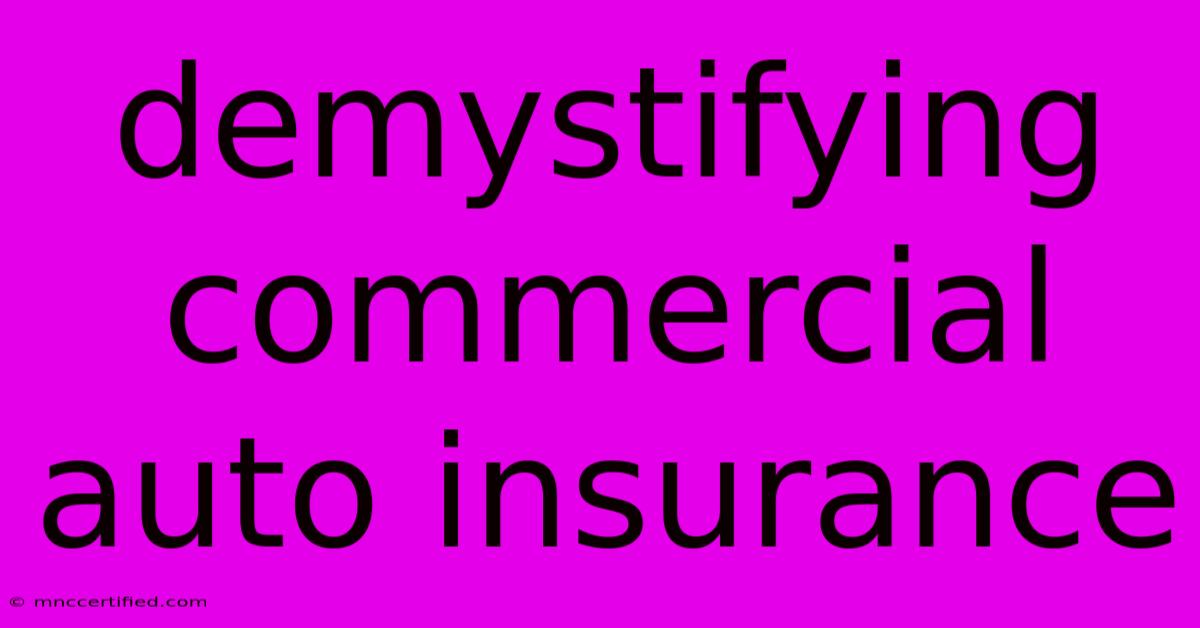Demystifying Commercial Auto Insurance

Table of Contents
Demystifying Commercial Auto Insurance: A Guide for Business Owners
Running a business involves a multitude of moving parts, and navigating the complex world of insurance can feel overwhelming. Commercial auto insurance, in particular, often presents a confusing maze of terms and coverage options. This comprehensive guide aims to demystify commercial auto insurance, empowering you to make informed decisions that protect your business and assets.
Why Do I Need Commercial Auto Insurance?
Your standard personal auto insurance policy won't cut it when your business is involved. Commercial auto insurance is essential for businesses that use vehicles for work purposes, including:
- Delivery Services: Couriers, food delivery companies, and transportation services rely heavily on their vehicles and need coverage tailored to their specific needs.
- Sales Teams: Sales reps on the road require coverage for business-related accidents and potential liability claims.
- Service Businesses: Plumbers, electricians, and other service providers using company vehicles need protection for potential incidents.
- Construction Companies: Hauling equipment and materials requires specialized coverage that addresses the unique risks associated with construction work.
Understanding the Basics: Key Coverage Types
Commercial auto insurance typically includes several essential coverages, each addressing a specific risk:
1. Liability Coverage: This is the most important coverage, protecting your business from financial ruin in case of an accident involving injury or property damage to others.
2. Collision Coverage: Covers damage to your vehicle resulting from an accident, regardless of fault.
3. Comprehensive Coverage: Protects against non-accident damage like theft, vandalism, fire, or natural disasters.
4. Uninsured/Underinsured Motorist Coverage: Provides protection if you're involved in an accident with a driver who has insufficient or no insurance.
5. Medical Payments Coverage: Pays for medical expenses for you and your passengers, regardless of fault.
6. Personal Injury Protection (PIP): Covers medical expenses, lost wages, and other expenses for you and your passengers, even if you're at fault.
7. Rental Reimbursement: Provides funds to cover vehicle rental costs while your insured vehicle is being repaired.
Tailoring Your Coverage: Factors to Consider
The ideal commercial auto insurance policy is not one-size-fits-all. Several factors influence your coverage needs:
- Type of Vehicles: The type of vehicles your business uses (e.g., trucks, vans, motorcycles, trailers) will dictate the specific coverage requirements.
- Number of Vehicles: The more vehicles your business operates, the more extensive coverage you'll need.
- Driver History: The driving records of your employees can impact your insurance premiums.
- Business Operations: The nature of your business and its associated risks will influence the coverage you need.
- Geographic Location: Different states have varying insurance regulations and risk factors, affecting your premiums.
Navigating the Process: Tips for Choosing the Right Policy
- Shop Around: Get quotes from multiple insurance providers to compare coverage options and pricing.
- Understand the Coverage: Read the policy documents carefully to understand the specific terms, exclusions, and limitations.
- Consider Your Risk: Evaluate your business's specific needs and potential exposures to ensure adequate coverage.
- Ask Questions: Don't hesitate to ask your insurance agent for clarification on any aspect of the policy.
- Maintain a Clean Driving Record: Encourage your employees to follow safe driving practices and avoid accidents, as this will help keep your premiums down.
Conclusion: Safeguarding Your Business with the Right Insurance
Commercial auto insurance plays a crucial role in protecting your business's financial stability. By carefully considering your needs, researching available options, and choosing the right policy, you can effectively manage the risks associated with operating vehicles for work purposes. Remember, informed decisions pave the way for a secure and prosperous future for your business.

Thank you for visiting our website wich cover about Demystifying Commercial Auto Insurance. We hope the information provided has been useful to you. Feel free to contact us if you have any questions or need further assistance. See you next time and dont miss to bookmark.
Featured Posts
-
No 9 Unc Battles But Loses To No 1 Team
Nov 09, 2024
-
Meet Alfie Oakes Floridas Seed To Table Farmer
Nov 09, 2024
-
Federal Judge Strikes Down Parole In Place
Nov 09, 2024
-
Grammy 2025 Nominees Full List
Nov 09, 2024
-
Alice In Wonderland Disney Trading Pins
Nov 09, 2024